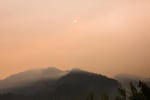
The Eagle Creek Fire as seen from the Bonneville Fish Hatchery, Sunday, Sept. 3, 2017. Human-caused wildfires are on the rise in Oregon and the forestry department lays some of the blame on COVID-19.
Bradley W. Parks / OPB
The coronavirus pandemic may be contributing to the increase in human-caused fires around the state, according to the Oregon Department of Forestry.
Through July, humans have caused 90% of fires this year in Oregon. That’s a jump from the yearly average of 70%, said ODF public information officer Jim Gersbach. Lightning is responsible for the remaining naturally occurring wildfires.
“The pandemic, if anything, has meant we’ve seen more human fires,” Gersbach said.
That trend has ODF on high alert as fire-prone conditions intensify. Last week the forestry agency raised the fire danger level to high (yellow) for most of western Oregon, except for four coastal counties. The department said extreme heat and dry conditions led to the high danger level.
“Fighting fires in hot and dry conditions is extremely taxing on those who are trained to protect our lands from fire,” ODF’s Western Lane District unit forester Chet Behling said. “We are asking that our public remain mindful of this as they conduct activities throughout the coming days.”
Despite increased risk of wildfires, people are still heading to the forest in droves.
Gersbach’s department is attributing the relatively high number of wildfires to the increasing flow of people venturing out to enjoy nature after being cooped up for months to slow the spread of the coronavirus. The resulting increase in car traffic on forest roads and campfires in the woods may be contributing to fires.
He’s also worried that campfires — including the ones that are not completely extinguished — may be contributing to the increase in human-caused fires so far this year.
“So that’s a bit concerning and certainly a reason why the public should be mindful while enjoying the outdoors this time of year,” Gersbach said. “That same kind of weather that makes it enjoyable to go hiking or recreating also makes the woods a lot more susceptible to catching fire if there’s a source of ignition.”
The 10-year average is 355 human-caused fires by the end of July. There have been 400 so far this year.
“So that is what’s different this summer, people are the problem,” he said. “We’ve been lucky, mother nature has been giving us relatively small amounts of lightning compared to say a typical year.”
Below-average lightning-caused fires have offset the increase in human-caused fires. And since fires started by vehicles and campfires are easier for crews to reach, the overall effect this year has been a lighter-than-usual demand on wildland firefighters in Oregon — so far.
